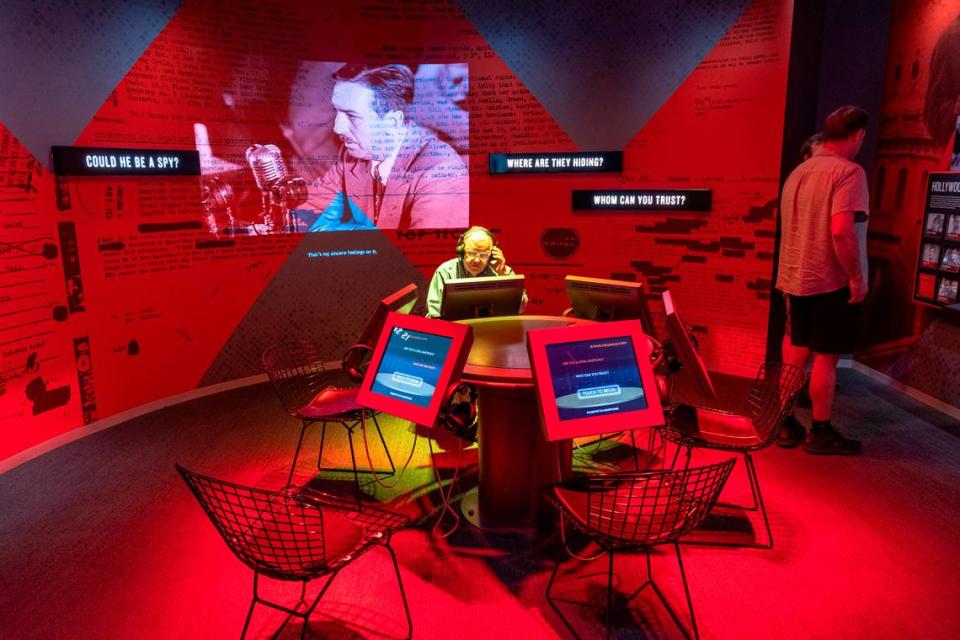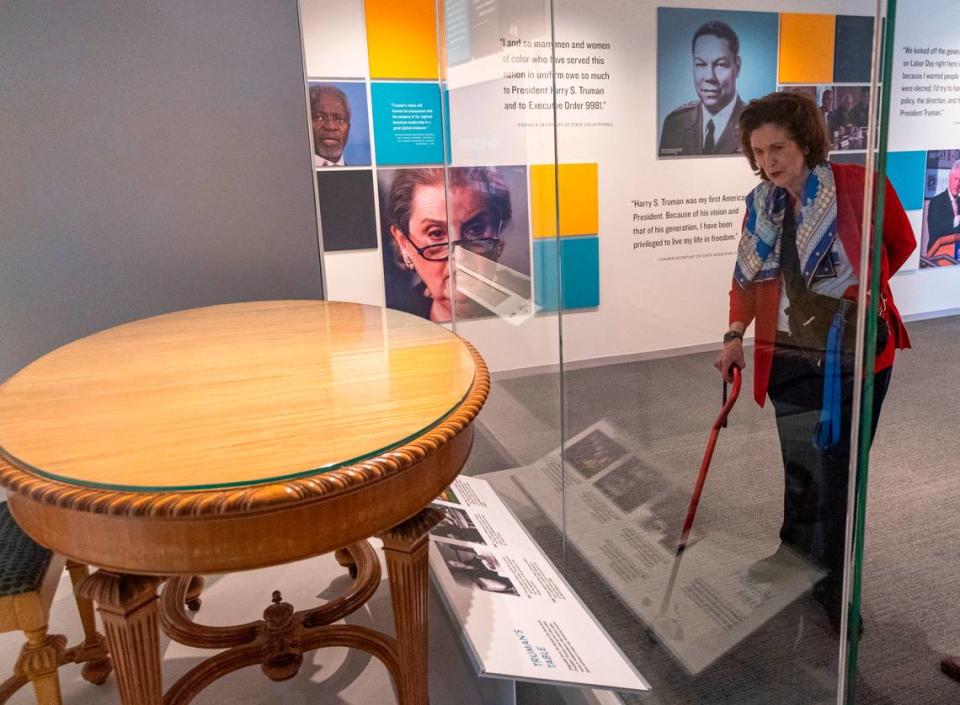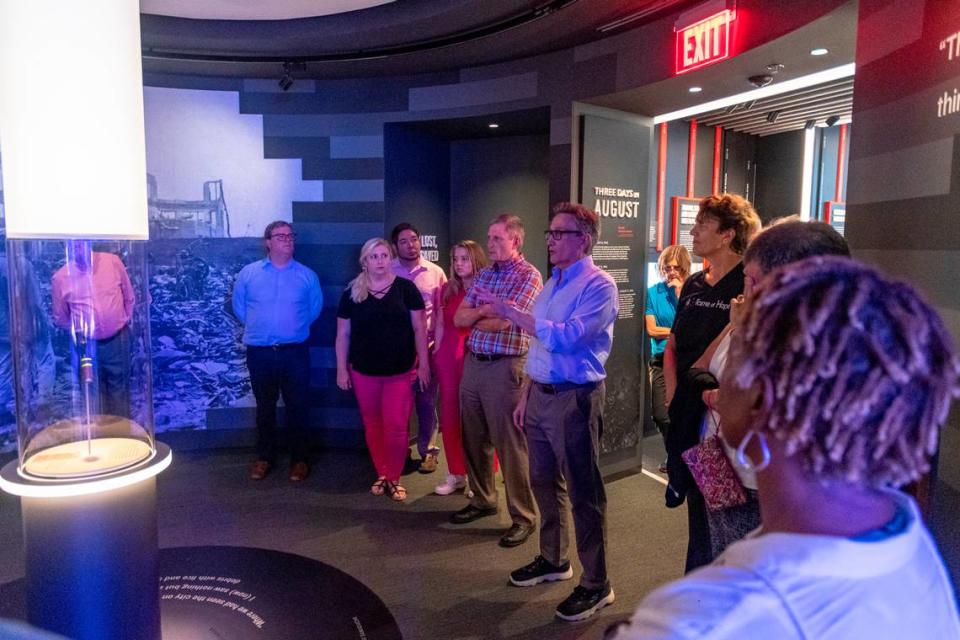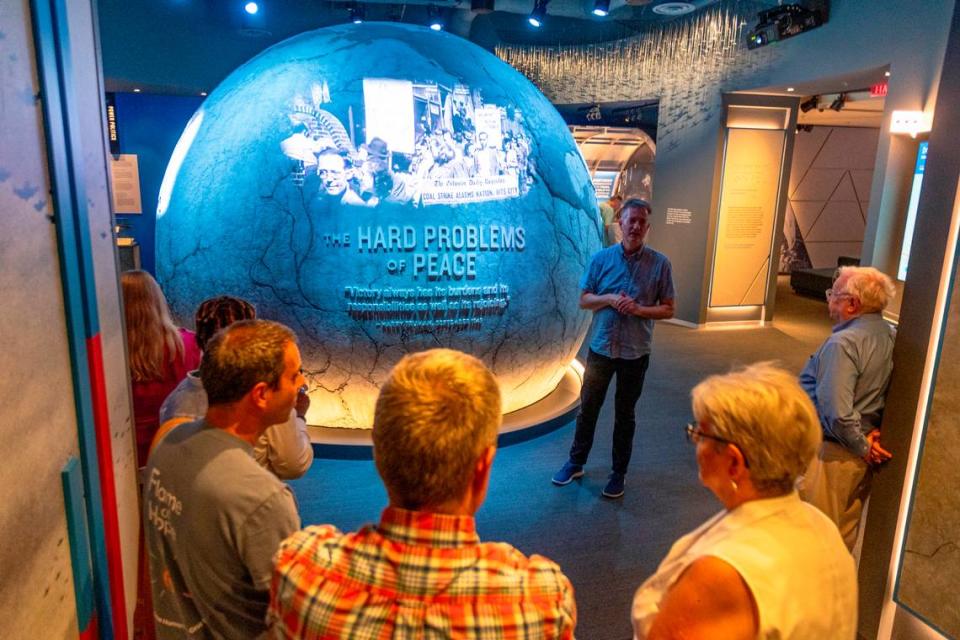‘Don’t let it go to your head’: Descendants of US presidents bond at Truman museum
Your Guide to KC: Star sports columnist Vahe Gregorian is changing uniforms this spring and summer, acting as a tour guide of sorts to some well-known and hidden gems of Kansas City. Send your ideas to vgregorian@kcstar.com.
In certain ways, Clifton Truman Daniel enjoyed a conventional relationship with his grandfather.
When he’s asked what great wisdom Harry S. Truman dispensed upon him, he jokingly thinks of scolding terms: “‘Get out of here! Stop running with that. No, no, no, no, finish your dinner or you can’t have a cookie.’”
Truman also wanted to encourage his grandson to get an education — from the time he was about 4. That’s why early one morning his grandfather nabbed Clifton trying to watch TV and instead insisted on reading aloud to him and one of his younger brothers.
The text was Thucydides’ “History of the Peloponnesian War,” which to the marvel of Clifton’s mother, Margaret, somehow held the attention of her sons, even with no pictures.
It was almost like his grandfather was different from other ones, something Clifton didn’t start to grasp until the first day of first grade.
Since his parents “hadn’t gotten around to” telling him Grandpa had been the 33rd president of the United States and all, imagine his surprise when his teacher asked, “Wasn’t your grandfather president?”

A unique camaraderie
It’s a funny story, to be sure. But it’s also testament to both the blessing and the burdens of being presidential progeny.
That’s why, Daniel said, Grandpa once said, “Presidents shouldn’t have children. Because those children will spend the rest of their lives with people thinking they ought to live up to their ancestors.”
That helps account for why Daniel’s mother was known to tell people who thought they recognized her that they were wrong.
It’s also why Massee McKinley — remarkably, the descendant of both Republican William McKinley and Democrat Grover Cleveland — was told at a young age, “Don’t let it go to your head.”
And why Tweed Roosevelt, the great-grandson of Theodore Roosevelt, went from bristling at being taken to task for breaking the dress code at Harvard to embracing the notion that great responsibility comes with the ancestry — like it or not.

That common consciousness accounts for the unique camaraderie within the relatively recently founded Society of Presidential Descendants, who gathered on Saturday for a tour of the Harry S. Truman Presidential Library and Museum in Independence.
The group, which earlier in the day visited The National WWI Museum and Memorial, also was due Sunday at the Dwight D. Eisenhower Presidential Library, Museum and Home in Abilene, Kansas.
Their convergence here made for a fascinating scene at the Truman museum, which since its $30 million extreme makeover and reopening in 2021 has morphed from a somewhat disjointed but appealing visit into a sophisticated and mesmerizing must-see.
“It’s so much easier, and there’s so much more of it,” said Daniel, who was 15 when his grandfather died in 1972 and is honorary chairman of the library institute board. “It’s laid out beautifully. It’s night and day.”
Against that backdrop was a group dynamic that included thoughtful dialogue among role models for nonpartisan and bipartisan civility in politics, some poignant discussion and some whimsical moments.
For instance, late in the tour, 80-year-old Lynda Johnson Robb, daughter of Lyndon Johnson, saw the image of a bust of her father on Truman’s post-presidency desk and exclaimed … “Daddy.”

“My father really respected President Truman and thought he got a bad deal, that people don’t recognize all the wonderful things that he did,” she said. “And he was absolutely right.”
At one point along the way, a few members playfully asked Ulysses Grant Dietz whether his great-great-grandfather was indeed buried in Grant’s Tomb; in fact, Grant and his wife are not buried there but “entombed” above the ground.
Mid-tour, Daniel told a story about how rarely President Franklin D. Roosevelt had spoken with his then-vice president — Truman had no knowledge of the Manhattan Project’s atomic bombs in the making until hours after he ascended to the presidency when Roosevelt died 82 days into his fourth term.
“ ‘Your grandfather never told my grandfather a damned thing,’ ” Daniel remembered once telling Roosevelt’s grandson, David.
So the next morning when he greeted David Roosevelt at breakfast by asking how he was, Roosevelt said, “I’m not going to tell you.”
Until just a few years ago, that sort of kinship among what McKinley called “accidents of birth” was common but not formalized. There was typically upbeat chemistry when they’d happen upon each other, though, enough so that Daniel recalled some joking around about forming a club.
“We need secret decoder rings,” he said, smiling. “We want a plane and a lair.”
They’re still waiting on those.
But after Roosevelt and McKinley met at a White House Historical Association event in 2018, they decided to launch an organization for fellowship with their descendant brothers and sisters and to promote civic engagement and presidential scholarship.
It has some 150 members now, with Johnson and Amy Carter thus far the only children of former presidents to have joined.
For all the fun of it, though, there’s something more to the concept.
“We all have two jobs,” said Daniel, a former newspaper feature writer who has written and lectured extensively about the family and has played his grandfather in a one-man show. “One is to take care of your ancestor’s legacy, but the second thing is to do something with it on your own.
“That’s why I went to Hiroshima and Nagasaki (first in 2012). I thought I could make a bit of a difference.”

‘Fat Man’ and Sadako’s origami cranes
Their visit made for a powerful lens on a museum brimming with riveting details and artifacts of Truman’s unfathomable rise from Everyman to the most powerful office on Earth — and into one of the most consequential and complicated of presidencies.
It aspires to tell the unvarnished truth of how a man propped up by Kansas City’s Pendergast machine became best known for standing on principle and the courage of his convictions, no matter how controversial.
As such, the museum directly broaches the agonizing spectrum of views of dropping the nuclear bombs on Japan in August 1945.
And while that issue in many ways is a focal point of the museum, director Kurt Graham leading the tour reminded that there were more than seven years to go in his presidency after that. Truman’s greatest legacy, he said, “was putting the world back together” after the war in what he termed the “innovative part of his presidency.”
The notion is deftly illustrated by a fractured globe at the museum and supported by the momentous years ahead marked by chapters and chapters of pivotal U.S. history:
The Fair Deal and the Truman Doctrine and the Marshall Plan and the integration of the armed forces and Truman’s instantaneous recognition of Israel. The Berlin Airlift and the Cold War and the forming of NATO and the United Nations. And so much more.
Still, no aspect of the museum is more moving than the solemn juxtaposition of an origami crane standing for peace in the same display as the safety plug from the “Fat Man” atomic bomb dropped on Nagasaki just months after Truman had been sworn in on April 12, 1945.
The crane was delivered to the museum in 2015 by Masahiro Sasaki.
The reason why exemplifies what the presidential descendants might most hope to achieve and stand for.
It was made by Sasaki’s little sister, Sadako, who was 2 years old when Hiroshima was decimated by the first of the two atomic bombs that killed more than 200,000 Japanese by the end of 1945.
By the time she died 10 years later after the sudden onset of radiation-induced leukemia, Sadako had folded some 1,300 paper cranes, hoping it would bring a return to health as told by legend.
Upon her death, the cranes came to be understood as a cry for peace in the world.
Sadako is immortalized with a statue at the Children’s Peace Monument in Hiroshima that honors her memory and that of the thousands of innocent children who died from the bombing.
And her memory is commemorated here because of her older brother’s relationship with Daniel. When they first met in person at a 2010 ceremony marking an anniversary of the Sept. 11 attacks, Sasaki’s son, Yuji, took out a tiny paper crane from a box.
Then he put it in the palm of the grandson of the president who presided over the horror that killed his Aunt Sadako and said, “That’s the last one Sadako folded before she died.”
That’s when the Sasakis asked Daniel’s family to come to Japan, where in 2012 they attended ceremonies and engaged with disarmament activists and listened to testimony from more than two dozen survivors.
A year later Daniel went back with his son, Wesley, and conducted dozens of interviews of survivors. Those are archived at the museum and many can be accessed by touch screen.
At a news conference during his first visit, Daniel was asked by a state-run media outlet if he had come to apologize for the unspeakable act still subject to debate over whether it ultimately saved both Japanese and American lives.
He wasn’t there to apologize, though, but to offer empathy and hopes of reconciliation.
“‘We’re here to honor the dead and listen to the living,’” Daniel remembered saying, “‘and keep this from happening again.’”

The Buck Stops Here
The visiting group, which also included descendants of James Monroe and Rutherford B. Hayes, prefers not to comment on matters concerning any of the living former presidents. But all descendants are invited.
The group also didn’t overtly speak to the state of contemporary politics beyond making a few general points.
“We need Harry Truman today,” McKinley said. “More so than ever before.”
Said Roosevelt: “The founders based this country on the idea that we had educated citizens who understood what their roles were. We hear all the time of people carrying on about their rights, but you don’t hear very much that your rights come with responsibilities.
“And those are responsibilities to your fellow citizens. … This country doesn’t work unless people accept their responsibilities.”
Spoken on the resting ground of a man known for just that as underscored by the sign he kept on the desk of his White House office and now prominently displayed at the museum:
“The Buck Stops Here.”
Through the good, the bad and the ugly, and all the shades in between that you’ll see at the museum, Truman’s story remains infinitely compelling and well worth exploring for hours here.
Including the chance to ponder how truly improbable his presidency was to begin with.
“I think (Truman’s) greatest accomplishment was showing the rest of us that a farmer, a small businessman, a soldier, can rise to the highest office in the land and do a better job of it than almost anybody else,” Daniel said. “That’s the promise of this democracy, the promise of this country.”
It’s also the reality of what these descendants know better than most:
These giants of history also were human, free to stand tall or fall … while also being “Daddy” or “Grandpa” to a precious few who could appreciate the meaning.
Star sports columnist Vahe Gregorian is changing uniforms this spring and summer, acting as a tour guide of sorts to some well-known and hidden gems of Kansas City. Send your ideas to vgregorian@kcstar.com.


